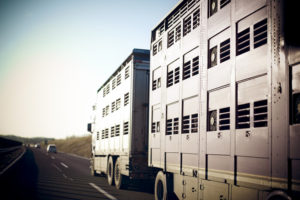**URGENT NOTICE** DAFM issues warning on transport of animals during current extreme weather conditions
- 18 July 2022, 14:16
The Department of Agriculture, Food and the Marine (DAFM) have issued a warning in relation to the transport of animals during the current spell of extremely high temperatures.
Temperatures are expected to rise to 40 ˚C and above in much of Continental Europe over the coming week. In particular Western and Central France will see extreme temperatures as well as Northern and Central Spain. Night time temperatures will also be consistently high in these areas. Areas such as the Rhone Valley, Ebro Valley and Central Plateau of Spain are unlikely to be compatible with transport of animals in compliance with Article 3 of Regulation 1/2005 for most of the coming week.
Article 3 of regulation 1/2005 ‘No person shall transport animals or cause animals to be transported in a way likely to cause injury or undue suffering to them.’
In addition, over the coming weekend, transporters should be aware that Ireland is likely to have temperatures in excess of 30 ˚C and that even short journeys should be avoided where possible
- Caen Temperatures will rise above 30 ˚C on Monday and Tuesday, falling back to the mid 20’s until Sunday when it will reach 30 again
- Rennes Temperatures will be above 30 tomorrow and again next Sunday.
- Rhine Valley Daytime temperatures will reach in excess of 30 for the coming week every day.
- Rhone Valley Temperatures consistently over 30 ˚C for the next seven days. In the Avignon region particularly, it is unlikely that travel in this region would be compatible with the transport of animals in compliance with Article 3 of Regulation 1/2005.
- Toulouse & Bordeaux, Temperatures will be below 30 on Wednesday and Saturday. For the rest of the week, daytime temperatures will consistently be in the mid-to-high-30 ˚C s.
- Ebro Valley (Zaragoza, Lleida) Due to consistently elevated temperatures reaching in excess of 40 ˚C , conditions in this region are unlikely to be compatible with transport of animals in compliance with Article 3 of Regulation 1/2005.
- Central Plateau Due to consistently elevated temperatures in excess of 40 ˚C , conditions in this region are unlikely to be compatible with transport of animals in compliance with Article 3 of Regulation 1/2005.
- Ferrara (Italy)Temperatures will remain consistently above 30˚C for the next five days. From Thursday it is unlikely that travel in this region would be compatible with the transport of animals in compliance with Article 3 of Regulation 1/2005.
This list is not comprehensive and caution is advised when assessing proposed journey logs to Europe at present until temperatures cool in the back end of the year.
The European Commission advises Member States, with reference to the Regulation, “that no long distance transports should take place if temperatures are forecast to exceed 30°C”.
Regulation 01/2005 – ‘3.1. Ventilation systems on means of transport by road shall be designed, constructed and maintained in such way that, at any time during the journey, whether the means of transport is stationary or moving, they are capable of maintaining a range of temperatures from 5°C to 30°C within the means of transport, for all animals, with a +/- 5°C tolerance, depending on the outside temperature.’
The Department considers that the default temperature intended by Regulation 1/2005, for inside a vehicle transport by land over a long journey, should be no greater than 30°C. The maximum permissible temperature within the vehicle is 35°C. Transport section has analysed a sample of returned journey logs and compared the temperature within the vehicle with the outside conditions; the temperature within the vehicle, in warm conditions, is usually significantly warmer than the outside temperature. A Swedish study of air temperatures within cattle trucks indicated that the mean temperatures were 3-6 °C higher within the truck than outside it.
- Popular

- Latest

Pender helps pay for his trip to the continent by winning good money at Chepstow
Irish Sport Horses take the Open Intermediate classes by storm at Cirencester





























